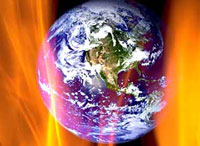Arctic Ice to Melt Entirely in 20 Years if People Continue to Smoke Sky
Officials representing 17 leading industrial countries, responsible for largest emissions of greenhouses gases in the atmosphere, gathered in London. British PM Gordon Brown stated that no future agreements would be able to correct the situation if the industrial countries fail to regulate their harmful atmospheric emissions.

Mr. Brown added that there were only 50 days left before the UN Climate Summit in Copenhagen to find a way out and save the world.
British Climate Change Secretary Ed Miliband said clinching a new pact was proving to be an "uphill struggle."
"This is absolutely not a done deal," he said after the 17-nation London meeting. Still, he said, "I feel it's more doable today than I did yesterday,” the Associated Press quoted him as saying.
As a result, the forum members, with Russia, the USA, Canada, India, China and Indonesia among others, agreed that they all need to restrict the volume of atmospheric emissions on the national level and increase the state funding of the measures to struggle against the global climate change.
The UN Climate Summit in Copenhagen will be held to approve a new document to replace the Kyoto Protocol, which will become the new international agreement to regulate the reduction of harmful emissions in the atmosphere of the planet.
It is an open secret that many countries do not wish to reduce their industrial activities which are accompanied with the emission of greenhouses gases in the atmosphere. The United States, one of the major adversaries of the Kyoto Protocol, initiated the forum of world’s largest economies to develop a new agreement.
Madeleen Helmer, who heads the Red Cross/Red Crescent Climate Center in the Netherlands, said at a recent conference in Thailand that the number of natural disasters had increased since 2000 from 200 to 350 a year.
Satellite images of recent years show that the polar cap of the Earth has been lessening in size. About 80 percent of ice will disappear in the Arctic Ocean during the forthcoming decade. It may vanish entirely in 20 years, scientists say.
It goes without saying that the Arctic Ocean plays a very important role in the global climate system. The ice layer disappears faster than people thought it would.
If the new international agreement is not approved, the world will face new conflicts caused with climate migration. About a quarter of the planet’s population – some 1.8 billion people – may suffer from the shortage of water by 2080.
Ivan Tulyakov
Pravda.Ru
Subscribe to Pravda.Ru Telegram channel, Facebook, RSS!


